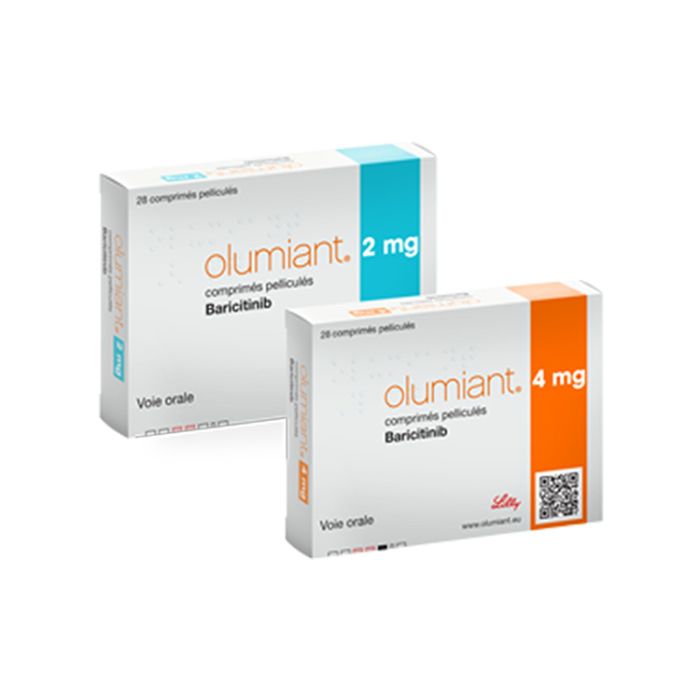Description
What is Olumiant (baricitinib) for?
Olumiant (baricitinib) is indicated for the treatment of patients with:
- Moderate to severe rheumatoid arthritis when standard treatment with disease-modifying anti-rheumatic drugs (also known as ‘DMARDs’) has not worked well enough, or if patients cannot tolerate them. Olumiant can be either be used alone or in combination with the disease-modifying drug, methotrexate[1,3,4].
- moderate to severe atopic dermatitis in adult patients who are candidates for systemic therapy.[5]
On November 19, 2020 the U.S. Food and Drug Administration (FDA) issued an emergency use authorization (EUA) for Olumiant (baricitinib), in combination with Veklury (remdesivir), to treat COVID-19 patients.[4]
EMA has started evaluating an application to extend the use of Olumiant (baricitinib) to include treatment of COVID-19 in hospitalised patients from 10 years of age who require supplemental oxygen.
How does Olumiant (baricitinib) work?
The active substance in Olumiant, baricitinib, works by blocking the action of enzymes known as Janus kinases which play an important role in the process of inflammation and joint damage that occurs in rheumatoid arthritis.
By blocking their action, baricitinib helps reduce the inflammation and other symptoms of the disease[1].
Where has Olumiant (baricitinib) been approved?
Olumiant (baricitinib) was approved for the treatment of patients with moderate to severe rheumatoid arthritis when standard treatment with disease-modifying anti-rheumatic drugs has not worked well enough or if patients cannot tolerate them by:
- European Medical Agency (EMA), European Union, February 2, 2017[1]
- Therapeutic Goods Administration (TGA), Australia, January 23, 2018[3]
- Food and Drug Administration (FDA), USA, May 31, 2018[4].
The U.S. Food and Drug Administration (FDA) issued an emergency use authorization (EUA) on November 19, 2020 for Olumiant (baricitinib), in combination with Veklury (remdesivir), to treat COVID-19 patients.[4] As of Jul 28, 2021, Olumiant alone is now authorized for the treatment of COVID-19.[6]
On April 29, 2021, EMA has started evaluating an application to extend the use of Olumiant (baricitinib) to include treatment of COVID-19 in hospitalised patients from 10 years of age who require supplemental oxygen.[7]
Please note that this medicine may have also been approved in other regions than the ones we’ve listed. If you have a question about its approval in a specific country feel free to contact our support team.
How is Olumiant (baricitinib) taken?
The standard dosage is[2,3,4]:
- 2 to 4mg once a day.
The dose can be reduced to 2mg once a day when the disease is under control or under certain conditions like kidney function or age of the patient.
Warning: Serious infections leading to hospitalization or death, including tuberculosis and bacterial, invasive fungal, viral, and other opportunistic infections, have occurred in patients receiving Olumiant (baricitinib).
Complete information about Olumiant (baricitinib) dosage and administration can be found in the official prescribing information listed in our references section[2,3,4].
Note: Please consult with your treating doctor for personalised dosing.
Are there any known side effects or adverse reactions of Olumiant (baricitinib)?
Common adverse reactions
The most common adverse reactions listed in the prescribing information include[2,3,4]:
- upper respiratory tract infections
- nausea
- herpes simplex
- herpes zoster
- changes in lymphocytes, neutrophils, hemoglobin, liver enzymes, and lipids.
Serious adverse reactions
The serious adverse reactions listed in the prescribing information include[2,3,4]:
- serious infections leading to hospitalization or death, including tuberculosis and bacterial, invasive fungal, viral, and other opportunistic infections
- thrombosis, including deep venous thrombosis, pulmonary embolism, and arterial thrombosis
Use in specific populations
Olumiant (baricitinib) is not recommended in patients with severe hepatic (liver) impairment or moderate to severe renal (kidney) impairment. There is not sufficient data available for the use of Olumiant (baricitinib) in pregnant women. It is advised to avoid breastfeeding

Reviews
There are no reviews yet.